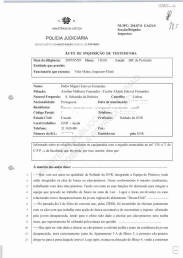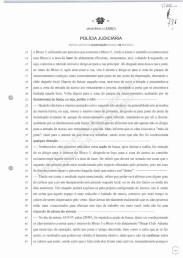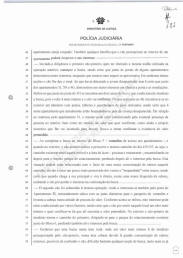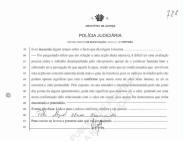|
03_VOLUMEIIIa_Page_785 |
 |
|
03_VOLUMEIIIa_Page_786 |
 |
|
03_VOLUMEIIIa_Page_787 |
 |
|
03_VOLUMEIIIa_Page_788 |
 |
Witness Statement of Pedro Miguel
Esteves Fernandes
Date: 2007.05.09
Location: DIC Portimao
Occupation: GNR Officerr
Location: GNR-Ajuda
The witness says
- that he comes to the process as GNR
soldier, being part of the search
dogs or trailers team. In this
capacity he serves as a K9 search
technician and works with
two sniffer dogs. He was asked to
bring his team to the Luz zone
(Lagos) related to the disappearance
of the minor from the Ocean Club.
- On the 4th
of May of the current year, around
23h, he was asked to use the two
sniffer dogs he has trained in the
search operation that attempted to
reconstruct the route taken by the
missing minor. For this purpose he
made the dogs sniff a bath towel
which had supposedly been used by
the missing minor.
- that after the first dog (Rex) was
given to sniff the towel near the
missing girl's apartment A of block
5, the dog headed to the door of
that apartment. Soon afterwards, he
headed towards block 4, using a
passageway*
that goes along block 5 (and leads
to the last ground floor apartment's
patio) and then using, turning left,
the path between block A and the
leisure area of the resort (that
includes the pools, the Tapas
restaurant, etc). In other words the
dog went around block 5 up to the
main street (Francisco Gentil
Martins). Once there, Rex crossed
the street and, next to the wall of
block 6, turned right and headed to
the area of the contiguous (public)
car park (just in front of the Tapas
secondary reception). More
specifically he went next to a lamp
post, smelling the ground there.
After searching that zone, he
crossed the road again towards the
entrance of the Tapas area and
smelled the door which was closed at
that hour. He then went back to the
parking zone and stopped being
interested i.e lost the scent.
- The same operation started with
the second dog and globally this dog
took the same route and headed to
the light post of the mentioned car
park, smelling there for some time
and finally losing interest in the
trailing. It should be stated that
the only difference is that this
second dog did not head to the
entrance of the (Tapas) leisure
area. Besides the witness informs
that the dogs had the "trailing
lead", a sign for the dog that he's
working, though no direction is
imposed on him.
- None of the dogs used in this
search operation, after having
smelled the towel, tried to get
inside of block 5. They headed (in
the passageway) to the path between
the block and the leisure area. The
witness states it should be noted
that the second dog may have been
conditioned by the route taken by
the first sniffer dog as he may have
followed the first dog's trail.
- Taking into account the
aforementioned result, the witness
states that it can be confirmed with
a certain degree of certainty that
the missing minor passed that
(dogs') route, on the day of the
events or even on the days before.
This situation can be explained by
the layout of the ground. That space
is actually reduced and flanked by
walls (the block facade and the wall
between the passageway and the car
park), which helps keeping longer
the scents that would otherwise be
affected by the wind. The witness
wants to let it clear that these
sniffer dogs are more used to do
this type of work in rural settings
where there is not such a high
diffusion of scents.
- Yesterday (08/05/07) around 23h45,
this search action was repeated but
this time the dogs were conditioned
to get inside of blocks 5 and 4 of
the resort. In this type of
operation, given the time that had
lapsed, and with the heat that could
already be felt, the results might
be rather relative given that the
dog will check all the scents he
comes across although he will mainly
do it with strong scents, namely if
an apartment is occupied. Also, any
noise perceived by the dog in an
apartment may kindle his interest.
- Initiating the operation, the
first sniffer dog, after having
smelled the same towel that was used
in the previous operation, began
searching. He certainly showed more
interest near the doors of some
apartments whilst he did not even
attempt to get closer to others. But
in none of these actions the dog
gave the handler the signal that he
had caught the scent of the missing
child. However, the dog showed more
interest in smelling the doors of
5J, 5H and 4G and the area nearby.
The witness states that next to 5H,
there were two bags of rubbish,
which conditions immediately the
search since the scent is more
intense and the dog has to
discriminate. Just outside apartment
4G was a tray with plates, cutlery
and cloth napkins, apparently used.
The witness is aware that the
parents of the missing child were
lodged (at the time) in this
apartment. In relation to the dog's
interest at doorway 5J, it might
have been conditioned by the
eventual presence of people inside
or by a scent that the dog wanted to
check. Having been trained to
search, the dog tends to check the
presence of the sniffed (referent)
scent.
- After completing the search in the
interior of block 5, verandas giving
access to apartments, and once in
the exterior, the sniffer dog took
the same route he had taken on
04/05/07, heading to the path
between the block and the (Tapas)
leisure area and then towards the
same parking area where he finally
lost interest in trailing. This
situation may be linked to the
biggest concentration of odours in
the path, more preserved and
protected from the winds as it is
flanked by walls (the high wall of
the Tapas leisure resort and the
smaller walls of the patios). When
the dog arrived in the main street (FGM)
and turned right, there was more
diffusion of scents, which explains
that the dog finally stopped
searching.
- The second dog was submitted to
the same operation. He too showed
interest in the door of apartment
5J. Here he got up on his hind paws
to the parapet of the veranda and
raised his head in such a way as to
catch the odour. As mentioned
previously, this interest may be due
to various factors but it is certain
that, smelling an intense scent, the
dog has to check whether the
referent scent is present. In the
exterior, the sniffer-dog
immediately took the first dog's
route, heading to the parking area
next to block 6 where he lost
interest in trailing.
- The witness clarifies that a scent
is much more intense in a rural area
and therefore is immediately
detected by the sniffer dog. In the
exterior of an urban area, due to
the great concentration of scents,
the dog may be confused, making it
difficult to search as more time
goes by after the event.
- Questioned, the witness states
that in relation to an action of
this nature, it is difficult to
evaluate precisely the work of the
dog (Rex), even though he knows this
dog very well and is well aware of
what this dog is capable of. The
conditions that surrounded the
search contribute to increase the
degree of uncertainty and what the
dog revealed might only mean that in
an area of more intense scent what
he was checking was whether the
referent scent was present. The
handler therefore thinks that the
interest showed by the dog near the
doors of some apartments may not
mean that he detected the referent
scent. The dog might have simply
checked, since he never showed his
handler that he had found the
searched scent.
- And nothing more was said, finds
it in conformity, ratifies and
signs.
*
The dogs' route shouldn't be
confused with another manner to turn
around block 5 consisting in going
up the steps leading from the
passageway (sometimes called
"corridor") to block 5 car park,
turning then left in the direction
of block 4 and left again in the
(public) path between blocks 5 and
4, that leads to the path between
block 5 and the resort.